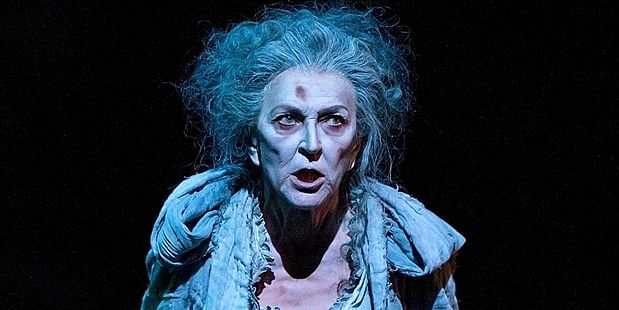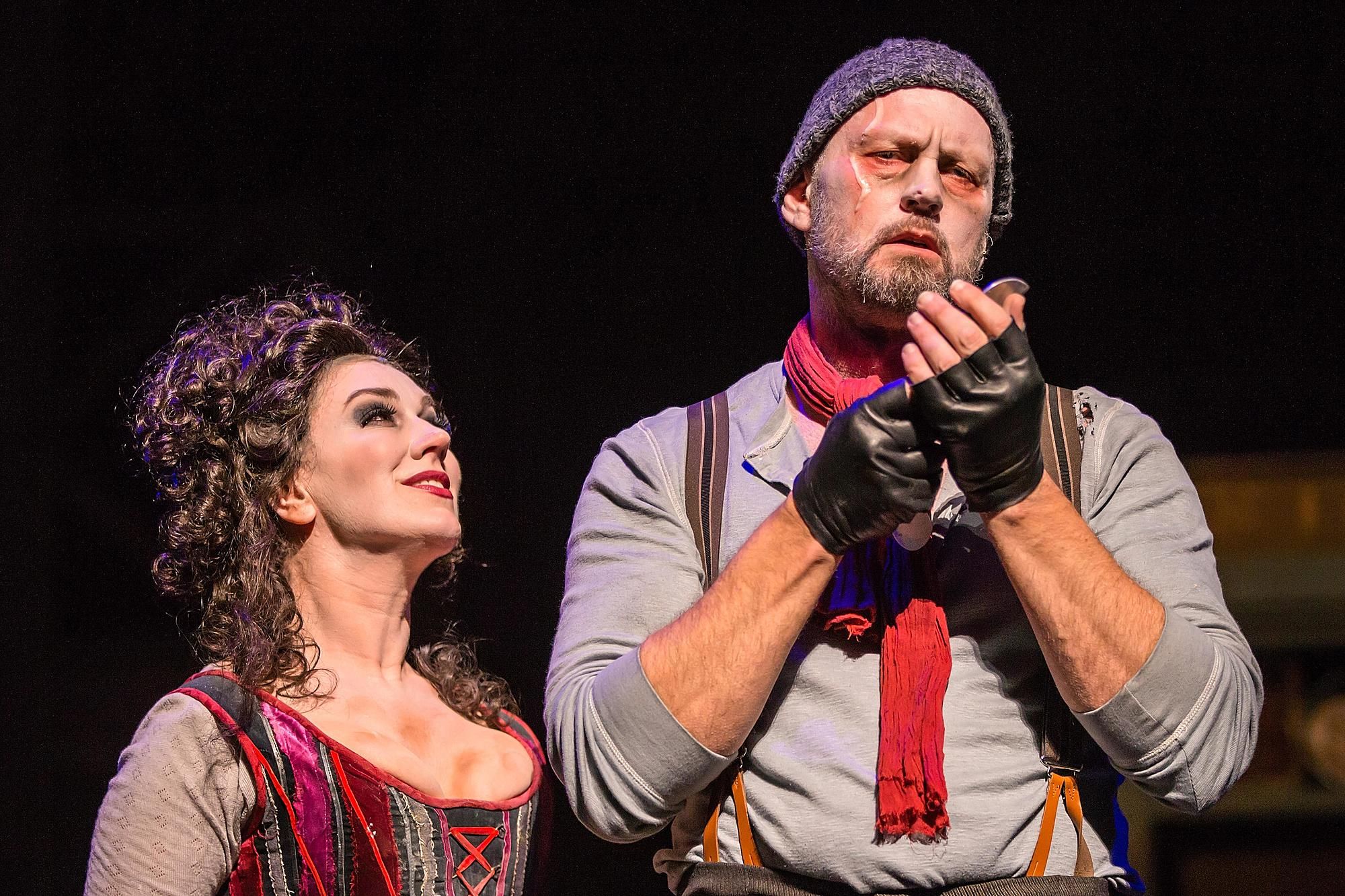Review: NZ Opera's Sweeney Todd
New Zealand Opera's foray into musical theatre is a powerful, bloodthirsty success - so why hasn't it been selling out?
New Zealand Opera's foray into musical theatre is a powerful, bloodthirsty success - so why hasn't it been selling out?
A devil’s advocate might ask: what’s an opera company doing putting on a musical? At its most pointed, the question implies a couple of things: firstly, that perhaps times are tough, and a musical is a cheap and popular money-maker; secondly, that opera singers wouldn’t do justice to musical theatre.
An equally devilish advocate might say that the question reveals more about our obsession with genre, and how protective we are of our own patch. It reveals a kind of prejudice. Anyone with ears soon learns that Sondheim’s Sweeney is no soft option. Sondheim at his best is a lyrical virtuoso, a wizard of counterpoint, and Sweeney is as rich and complex as any operatic so-called ‘masterwork’. But that’s not to say there’s no value in such a question.
The question is a valuable one, quite literally, because the punters were asking it. How can you put on a well-known musical at the Civic and not sell out? New Zealand Opera has made it clear that Sweeney Todd is part of an audience-building strategy. Sweeney is ideal because compared to an opera, the forces are smaller, the costs are less, and there can be more performances. But for it to be a money-maker and an audience-builder, it has to sell houses, and in many ways that has more to do with the marketing than the show – and if Friday night was any indication, many of the theatre-lovers the company is striking for – and many of its core opera audience – felt ambivalent enough about the idea of an operatic musical to stay away. The circle was only half full, which is a great shame, because anyone who did make it along would have been well hooked.
Sondheim, via playwright Christopher Bond, takes his plot from Victorian urban legend. Sweeney Todd is a broken man, once a successful barber, arriving in London after years away in a penal colony on a trumped-up charge. He discovers that the judge who sent him away raped his wife Lucy, who then poisoned herself, and that their newborn daughter Johanna has been adopted, or rather imprisoned, by the very same judge. Under a pseudonym, Sweeney sets up business again above Mrs Lovett’s pie shop, and vows to take revenge.
From the outset, this production aims for maximum impact. Every element packs a punch, from its grand set design to its lush costuming, from sparkling pit orchestra to lusty chorus. Collectively, these elements build a bold, gothic frame — a hole in the world, like a great black pit — through which we can see all the dramatic nuance and lyrical intricacy of Sondheim’s creation. The set’s stone columns and scaffolding complement The Civic’s own interior architecture, while the lighting cleverly highlights but also obscures, with soft dusty tones capturing the leery grunge of 18th century industrial London.
Before the first chorus, we hear the shrillest of whistles. It’s a recurring motif throughout, taking on increasingly authoritarian and murderous significance. The whistle — think nails on a blackboard, amplified to breaking point — is echoed in the opening number by sighs of sliding harmonics in the violins, mixed with a plaintive oboe line. It’s indicative of how well the concrete action of the stage is integrated, suavely stylised, into Sondheim’s musical language.
The rhythmic tightness and cohesion of the whole ensemble (embodied by Benjamin Northey’s hardworking orchestra), the chorus (all soloists in their own right) and indeed in the lead roles – this was where we saw the polish and payoff of a full operatic cast and production. The diction was uniformly excellent and the chorus were well-drilled and full of intensity. Sometimes I wondered whether a little more stillness amongst all the cut and thrust of the choreography might have let us feel the weight and darkness of Sondheim’s world, but the snappiness was compelling: Fleet Street was sharp and shiny and terrifyingly good.
Director Stuart Maunder’s production also had impact in foregrounding the physical and sexual elements of Sondheim’s characters and their relationships. Teddy Tahu Rhodes’ first entrance as Sweeney Todd had him showing some skin in a low-cut top, and it was a bold choice to include Judge Turpin’s self-flagellation song, often cut from productions because of its risqué content. The climactic orgasm-cry (“Deliver me! God!”) exemplified Philip Rhodes’s (and the company’s) full-throated commitment to sleaze. Some might question the sexing up of the traditionally rather chaste exchanges between young lovebirds Johanna (Amelia Berry) and Anthony (James Rodgers): did it undermine their characterisations? In my view it was the right decision, giving Johanna some much-needed agency early in the show, and Berry shouldered the responsibility with panache.
Berry and Rodgers were strong singers in a strong cast: after some early pitchiness from Berry, the pair projected both clarity and tenderness. It was clever casting against not only the rich, dark-toned duo of Teddy Tahu Rhodes and Antoinette Halloran, but also against the flamboyant agitators Signor Pirelli and the Beadle. As Sweeney’s business rival Pirelli, Robert Tucker milked the Italian tenor stereotype for all it was worth, with militant consonants and melodramatic vowels (“I have-a da grace... I win-a da rrace---!”), while Andrew Glover’s Beadle (a corrupt city constable) was a crowd favourite, with a campy swish of his leather coat and a cheerfully psychopathic turn at the organ. The Beadle’s ostensible master, Judge Turpin, was revealed in all his sadomasochistic glory, Philip Rhodes making up for his youth with the whole gamut of patrician airs and a menacing quaver in his voice.
Like Glover’s Beadle, Helen Medlyn’s Beggar Woman flicked between moods, even characters, with consummate ease: one minute she was eliciting pity with “alms, alms”, the next making no bones about offering “a little bounce around the bush”. But the Beggar Woman was not simply an entertaining comic caricature: each time we encountered her, she took on more and more of the qualities of a latter-day Cassandra – a desperate, apparently unhinged woman, dismissed as hysterical, who turns out to be the prophet no one believed. Pathetic in the true sense: full of pathos. That’s the genius of Sondheim’s score – these characters are rich, both immediately in their snappy lyrical surface, but also in the layers they accumulate through the course of the show: by the time the Beggar Woman meets her maker, we’re feeling the walls fall down around us too.
Joel Granger as Tobias Ragg (Toby, initially a servant of Signor Pirelli) handles some of the most rapid-fire singing of the show with dexterity and flair, matching his vocal acrobatics with sharp, precise movements on stage. Like the Beggar Woman, Toby has a kind of vision: he is able to see Todd for who he really is (or has become). When he tries to warn Mrs Lovett, there’s a softness and sensitivity in Granger’s voice that belies his age. Granger’s heartrending duet with Halloran (“Not While I’m Around”) is a highlight of the show, tinged with typical Sondheimian macabre: the creepiest of solo violin lines — rendered affectionately by concertmaster Andrew Beer — underscores Mrs Lovett’s promise that “nothing’s gonna harm you”, even as we hurtle towards catastrophe.
Together with Granger’s Toby, Halloran’s Mrs Lovett is the heart of the production. Not only does she have the range, power and charm to steal the show, but she really gets musical theatre. She shows a genuine willingness to sacrifice purity of tone for comic or emotional heft, a willingness to play and to compromise, and in so doing she captures perfectly the flexibility and pragmatism — bordering on amorality — of Mrs Lovett. Where Sweeney fans might be used to the chattering, slightly skittish (though undeniably brilliant) interpretations of Angela Lansbury or Sheila Hancock, Halloran brought her own qualities of depth and darkness to the role. Her voice had all the gristle and gravy and gloss of her Act II pies – the human flesh ones.
Her voice had all the gristle and gravy and gloss of her Act II pies – the human flesh ones.
Then, of course, there's Teddy Tahu Rhodes. Rhodes is the darling of the New Zealand opera scene. He cuts an impressive figure on stage – or on a glossy poster – and he has a solid, even powerful, operatic singing voice. From a marketing perspective, he’s a dream; from an artistic perspective, he’s simply unfit for the role of Sweeney Todd: not only in terms of his acting ability, which is well documented, but his voice.
The bizarre decision to speak with his singing resonance, and his ubiquitous vibrato and consistent legato phrasing, cancel any emotional nuance when he sings or speaks. It’s inaccurate to call his performance monotonous, because there are two tones: there’s what one might call “neutral” — a full, if somewhat unfocused sound — and there’s gruff, the only attempt to modulate it towards anger, or in fact any emotion. It’s unclear how much this is a deliberate choice by Rhodes or Maunder, to play Sweeney as inhuman. He’s been rescued from a shipwreck – something has changed him, perhaps he’s even dead – but it’s without question that he has emotions: anger, certainly, but also bloodlust, frustration, even tenderness.
There are occassional payoffs to this approach (like when he steps out of this two-tone style to impersonate a seagull), but the unintentional humour of his wooden acting also threatens to overturn the momentum of the whole show. In one of its most pivotal moments, Sweeney realises he’s killed his wife Lucy. When he first encountered Mrs Lovett, she’d told him what she thought was a useful but harmless half-truth: that Lucy had poisoned herself. So when it’s revealed that the “half-crazed” beggar woman – who Sweeney has callously dispatched – was in fact his wife, it’s devastating. He realises that all his sustaining anger, his ruthless spree of murders, has been built on a lie from a desperate and opportunistic bid to usurp Lucy’s place at his side — lines like “poor thing” and “throw the old woman out” take on a new light in retrospect — and perhaps worse, he feels the crushing weight of guilt that he didn’t recognise his own love.
So when Teddy Tahu Rhodes speaks his lines, “Oh no, oh god” with such prosaic flatness, virtually passing over the moment of realisation, skipping straight to righteous ‘anger’, he not only ruins the scene, but the emotional hinge of the whole work.
Although this was a New Zealand-based operatic production of a Broadway adaptation of a Jacobean Tragedy set in Victorian London — although it had slipped sideways from its original context —this production of Sweeney Todd still hammered home universal observations. How power and powerlessness both corrupt; how music, like the human psyche, walks a fine line between the lucid and the irrational, the comic and the tragic.
And to come back to my original question, in my mind there’s no good reason this shouldn’t have sold out. Compared to recent ham-fisted attempts at musicals by local theatre companies, New Zealand Opera did almost everything right, giving Sondheim’s music the respect it deserves and executing a taut, vital piece of tragicomic entertainment. Despite a near-fatal flaw in casting, this was a powerful, bloodthirsty feat.
NZ Opera presents
Sweeney Todd: The Demon Barber of Fleet Street
Auckland • Wellington • Christchurch
17 Sep – 15 Oct 2016





